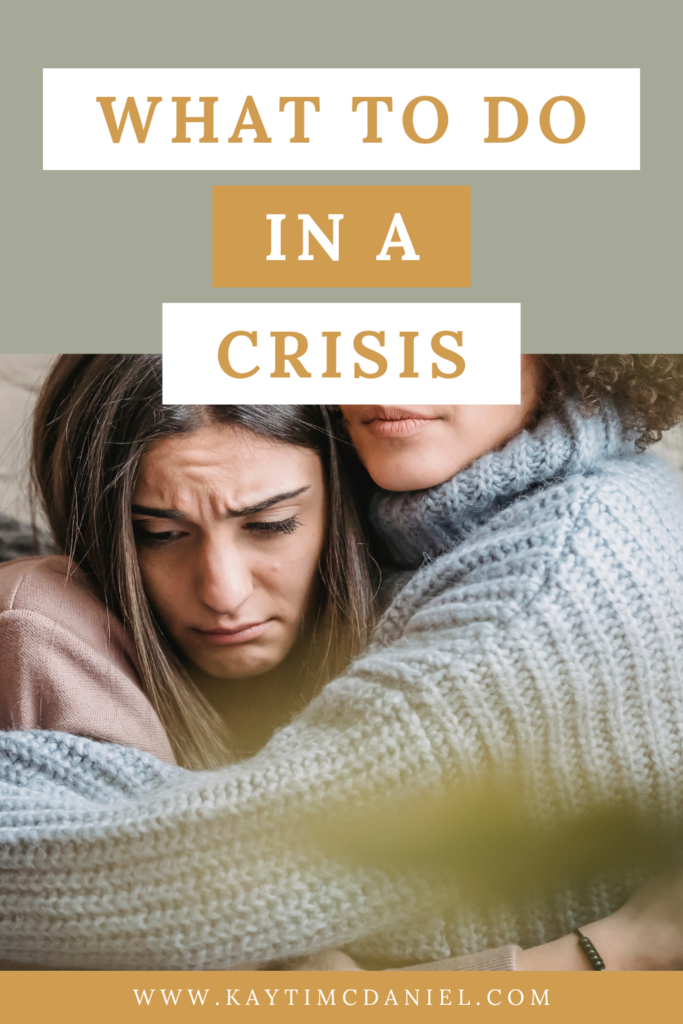
It can be scary, overwhelming, and confusing when you or someone you love is experiencing a mental health crisis. Sometimes, you may wonder whether your experience is considered an emergency and, if so, what you can do to stay safe. In this post, I share what to look out for and a few ways to respond during a mental health crisis.
Signs of a Mental Health Crisis
While everyone has their own personal signs of crisis, here are a few specific experiences to pay attention to:
- Having thoughts of hurting yourself or someone else
- Having hallucinations (hearing or seeing things that others do not)*
- Having delusions (strange beliefs that seem inconsistent with reality and cultural context)*
- Being unable to meet basic needs (such as food, clothing, shelter, or safety) due to a mental health challenge
- If you are a parent, being unable to meet your child’s basic needs (such as food, clothing, shelter, or safety) due to a mental health challenge
*If you are managing a mental health condition where these symptoms are a part of your regular experience, this may not be an emergency. In this case, these symptoms may be considered a crisis for you if they suddenly become much more intense than usual.
What to Do During a Mental Health Crisis
If you or someone you love is experiencing a mental health crisis, it’s important to act quickly. Here are some things you can do to stay safe:
Connect with a crisis counselor.
If you prefer to connect over the phone, call the 988 Suicide and Crisis Lifeline to speak to a trained crisis counselor. Don’t let the name deter you if your emergency is not related to suicide – as you’ll see on their website, this is a resource for anyone in emotional distress:
“No matter what problems you’re dealing with, whether or not you’re thinking about suicide, if you need someone to lean on for emotional support, call the Lifeline. People call to talk about lots of things: substance abuse, economic worries, relationships, sexual identity, getting over abuse, depression, mental and physical illness, and loneliness, to name a few.”
Support is available 24/7 by calling 988.
If you prefer texting, reach out to the Crisis Text Line at 741741. You’ll be connected with a trained volunteer who is there to help you return to a calm, safe state. If needed, they can also provide referrals for additional support.
Call 911.
For many people (especially those with mental health challenges or from communities of color), calling 911 can understandably feel threatening or even unsafe. If you choose to call 911 to support yourself or someone you love during a mental health emergency, here are a few ways to increase safety for everyone involved:
- If possible, have a trusted family member, friend, or neighbor present when you call and wait for the police.
- Let the 911 dispatcher know that you are experiencing a mental health crisis.
- Explain the specific thoughts or behaviors that tell you this is a crisis (ex: “I’m having thoughts of killing myself”). This will give first responders more context about the emergency they’re approaching.
- Request a CIT (Crisis Intervention Team) officer. These are officers who have received specialized training to support you during a mental health crisis.
- Do your best to stay calm.
When the officers arrive, they will assess your crisis. When necessary, they will also support you with safe transportation to the nearest emergency room.
Go to the emergency room.
Visit your nearest emergency room to connect with a team of professionals who can offer a safe environment to better assess your crisis. They will also provide services/resources to help you stay safe when the crisis has passed.
Preparing for a Future Mental Health Crisis
A mental health crisis can be so much more overwhelming when you aren’t sure what to do. Planning ahead can go a long way in helping you and your loved ones feel more confident and prepared during a hard moment. Click here to learn how.